Chess Journalism in Perspective
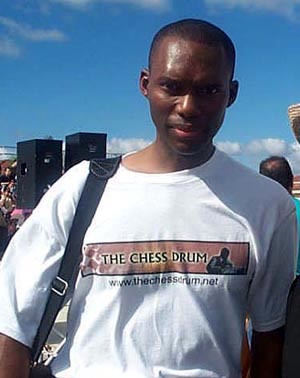
At the launching of the World Chess Hall of Fame in Miami in 2001,
the inaugural year of The Chess Drum.
Chess journalists often take on the task of presenting the face of chess to the world and oftentimes, that effort is overlooked or taken for granted. In my almost 18 years of covering chess for The Chess Drum, I have met some of the hardest-working professionals in chess journalism. I have provided live coverage for six Olympiad tournaments, a World Championship, several top-level events and many open tournaments. I have interviewed dozens of Grandmasters, rising scholastic stars and rank amateur players. I have observed how vibrant and universal chess has become. There are stories waiting to be told.
Fortunately, social media has provided a platform and there is more accessibility of information from different countries. Thus, a more complete view of chess is presented. While social media has filled a void, it is necessary, but not sufficient media for chess coverage. Far too many simply post a few photos of an event without a proper context or leading story.
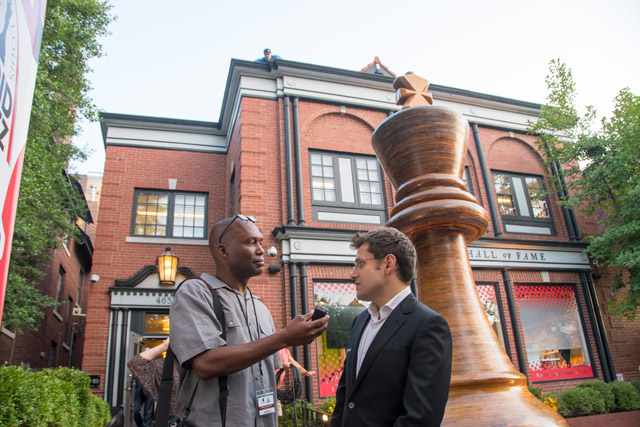
Interviewing Levon Aronian after the 2017 St. Louis Rapid & Blitz.
Photo by Peter Doggers.
Websites run by chess journalists still play a valuable role in news coverage and provide the type of insight that mass media often fails to deliver and a permanency that social media lacks. In addition, too many chess neophytes are assigned to cover major chess events and we are left to read the cringe-worthy puns and references. Even chess writers will fall prey to false narratives such as the issue of U.S. winning the gold medal by “importing” foreign talent.
Keeping the Drum Beat
In my sphere, I continue to primarily focus on players of African descent around the world and ensure they have the platform to show their contributions to chess and to provide them exposure. When I was a junior player, there was hardly any news about Black chess players. There were stories worthy of being told, but no one was telling them. This was one of the main motivations in the founding of The Chess Drum in 2001. Fast forward to the 2018 Olympiad, Black chess players have a tremendous presence which I have described in a photo essay, “African Diaspora makes impact at 2018 Olympiad”
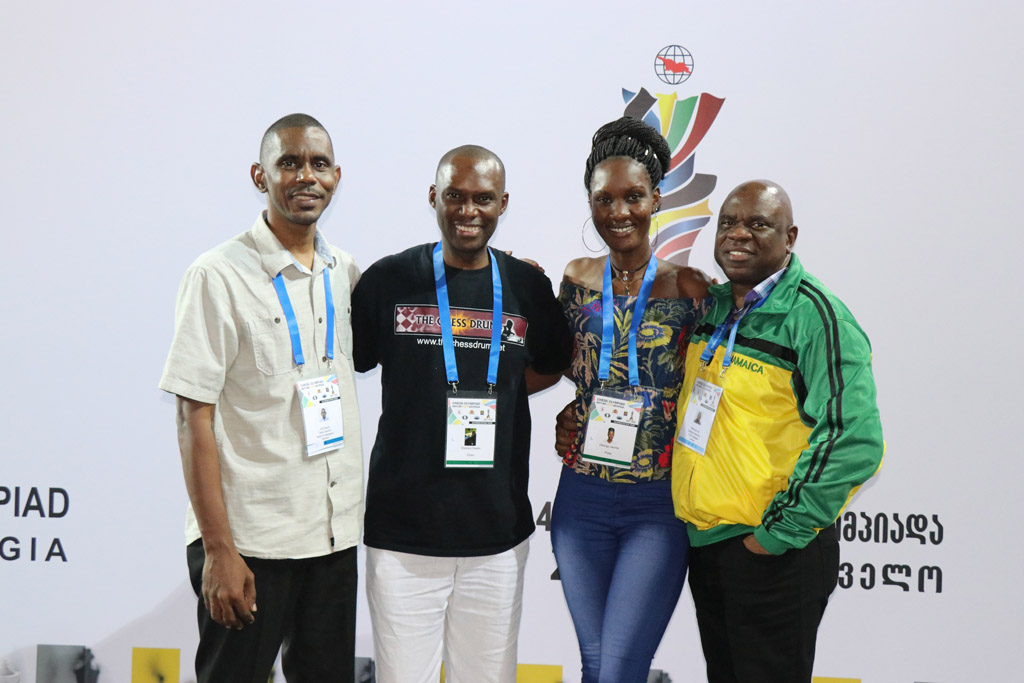
Chess journalists: Haydn Gill (Barbados), Daaim Shabazz (USA), Jacinta Odongo (Kenya),
Ian Wilkinson (Jamaica)
If one takes a good look at the interviews and photos of the 2018 Olympiad, it is obvious that chess covers the entire spectrum of demographics. In the past, most of the coverage on major chess websites had been on the top 20 players and the top 10 federations. Even today most sites are covering professional chess with only an occasional article on a small federation. It is interesting that one of the biggest triumphs spotlighting the virtues of chess was the story of Phiona Mutesi and the “Queen of Katwe.”
This compelling story was not about chess more than it was a story about a girl’s daring triumph over abject poverty. She is now a student a Northwest University, not far from Seattle. Unfortunately, the story did not get the proper exposure due to a poor marketing strategy. Many thought the movie was about a chess prodigy and that is the way it was advertised. The chess community also did not help matters in criticizing what they saw was an over-hyped chess figure.
I would be the first to admit that the articles written to market the movie were a bit misleading, so the chess community became more fixated on her low rating than her fascinating story. I wrote about a dozen articles on the story and attempted to focus more on the social upliftment in her life. Many simply could not relate and decided to focus on her chess statistics. In my opinion, it was a missed opportunity to showcase the qualities of chess.
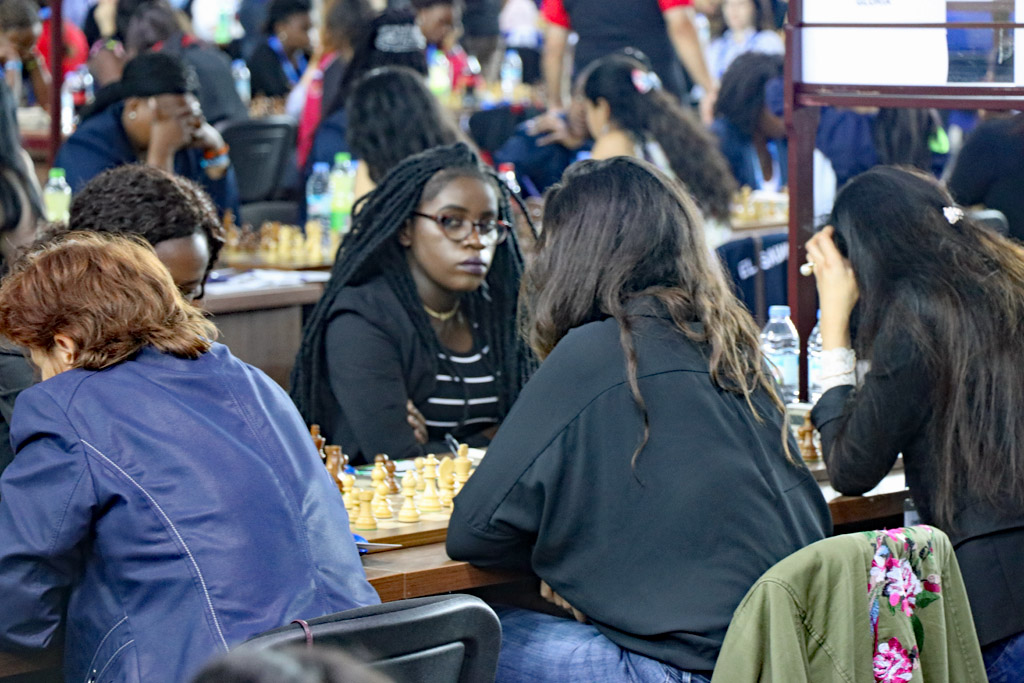
Phiona Mutesi of Uganda, the “Queen of Katwe”
at 2018 Chess Olympiad in Batumi, Georgia
Photo by Daaim Shabazz
Journalist Collegiality
For all counts, chess journalism is a rather thankless vocation as many put in hours of overage to report current events. It is very challenging. Most of the “friendly” agreements between journalists are based on the principle of collegiality and common goals of promoting chess. We request permission to use content with the understanding of proper attributions and credit. There are also the press room tips or reminders about press conferences and other events.
Mike Klein of chess.com always provides me with briefs in tournaments we cover together. I greatly appreciate this. It is a rather friendly environment since all are attempting to put the best face forward for chess. I have learned quite a bit from observing journalists at work. In particular, I have watched the photographers such as Puficheck (met at 2004 Chess Olympiad), David Llada, Lennart Ootes and Alina L’Ami and look to pick up tips.

Journalists’ Row at inaugural Sinquefield Cup in 2013
Cathy Rogers, Daaim Shabazz, Mike Klein,
Janis Nisii, Sabrina Chevannes
Photo by Dan Lucas
Unfortunately, in the world of journalism, many take umbrage to use photos and content without attributing properly. Maybe we all have been guilty at one time or another and we simply make the correction. However, this has become a major issue for journalists.
What prevents someone from using photos and content without any tacit permission of the owner? Nothing. There are all types of workarounds. However, if such an organization of journalists was created, it would serve as a force to prevent these actions and also to provide arbitration if in fact, there is a breach.
I missed the 2016 Chess Olympiad in Baku, Azerbaijan, but knew of the difficulties journalists faced. My trip to Batumi for the 2018 Chess Olympiad reaffirmed that journalists needed stronger lobbying to ensure proper conditions, for sharing content and techniques, for showcasing our work and to frankly, be a watchdog group.
The venue is clearly deficient. The playing area is very small, and you can't pack there 30 photographers (many others were left out). The commentary room can't seat more than 20 or 30 spectators. And the press room is 1/3 or 1/4 of what it should be. https://t.co/HJ2cC6MA0A
— David Llada ? (@davidllada) November 9, 2018
The Politicization of Chess Media
Unfortunately, chess journalism is often a casualty of political power plays executed to stifle honest reporting and critical analysis. The last ten years have been quite challenging given some of the contentious issues concerning FIDE. Journalists have a tough job in presenting all sides as objectively as possible and are often cast as catalysts for agitation. This has resulted in journalists having access restricted, being denied accreditation or even worse, being told they are not journalists. This resulted in a special FIDE Commission of Chess Journalists (CCJ) being formed for “approved” journalists.
Georgios Makropolous speaks on the creation of a commission for journalists and its goals. Advance to 22:55 into the clip. Video by North American Chess Association.
One of the tasks of the aforementioned CCJ is “to help protect chess journalists from plagiarism and copyright infringement etc.” as highlighted in the CCJ minutes in Tallinn, Estonia (2013). There are also principles of honoring intellectual property cited in CCJ minutes in Tromso, Norway (2014). What was interesting what that at the 2012 Olympiad in Istanbul, Turkey, I had discovered an infraction whereby a fellow journalist’s content from olimpbase.org was blatantly copied and used for profit to market a book on Olympiad history. This action violated all types of “fair use” clauses.
The offense was so egregious that I contacted the olimpbase.org owner Wojciech Bartelski and asked him whether he had extended rights for someone to write that book. He confirmed that he had not. My reason for revealing this issue publicly was for other journalists to see the extent to which our intellectual property can be violated. In fact, when I reported on this act of plagiarism, I was the target of a complaint filed with the FIDE Ethics Commission. When an act of blatant plagiarism is revealed, how can the offender then accuse the person (shedding light on it) of an ethics violation? How ironic!
https://t.co/8b4ydCQQ32 first TCF stole years of my work, then filed complaint v journalist who shed light on it @thechessdrum @chessninja
— olimpbase.org (@olimpbase) August 22, 2015
During the 2018 Olympiad, I chatted with Spanish journalist Leontxo Garcia and my friend Ian Wilkinson of Jamaica about the state of chess journalism and we all agreed that journalists are often forced to lobby for conditions each major event. This entails ensuring proper conditions (i.e., space and technical capability) for journalists to do their work, allowing some access to players, and also allowing reasonable freedom to photograph the event. Sometimes it’s not so easy.
Certainly, the situation varies from tournament to tournament and some organizations are more journalist-friendly than others. We can remember the 2016 World Championship in New York being fraught with access issues and journalists being seen queuing up outside the playing hall. It was the same for the 2018 Chess Olympiad and the 2018 World Championship in London as David Llada reported his frustrations on site. Coverage of chess events is too often an afterthought of organizers.
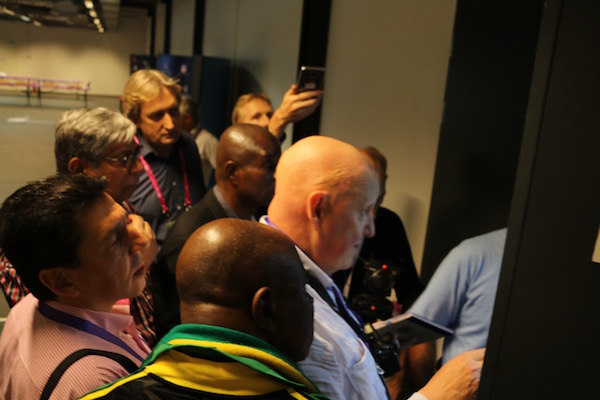
Journalists were initially restricted at the 2016 Chess Olympiad,
but the issue was ultimately resolved.
Photo by Mike Klein (chess.com)
This incident shows Maria Emelianova being harassed by the campaign of Georgios Makropoulos while recording a dispute between Iannis Makropoulos and Alexander Martynov over a legal issue. Video by Maria Emelianova (chess.com).
Congrats to @Macauley64 and @ChessBase for being awarded for professional journalism, even if the award comes from an anti professional body that @FIDE_chess should abolish. https://t.co/7q8PmO1Owg
— Stefan Löffler (@StefanLoeffler) October 1, 2018
Moving Chess Forward
.jpg)
There is a lot of good content being produced in an increasingly decentralized media world. It is a wonder that we have to raise the question, “Are chess magazines still relevant?” Of course they are! Furthermore books are still a valuable force and websites serve as a bedrock of permanency. Social media platforms are not fully indexed via search engine and are inaccessible to many. However, there are many websites like The Week in Chess and ChessBase standing the test of time.
Of course chess.com and chess24 are giant content providers and sites like The Chess Drum, Africa Chess Media, Kenya Chess Masala serve a veritable niche for the African Diaspora. Finally, we can’t say enough about ChessBase India which has contributed mightily to the chess revolution in India and has given us an inside view of the talent being generated in the country of 1.3 billion.
Based on many of these developments and the election of the new FIDE President Arkady Dvorkovich, we hope to see better conditions for chess journalists. There is a need to cover events accurately and to fill the press room with competent chess journalists who ask knowledgeable questions. Where do non-chess journalists go to find answers if they are given the assignment to cover a chess tournament?
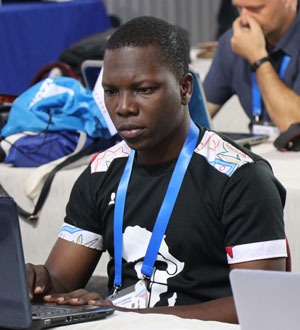
Ogunsiku Babatunde (Africa Chess Media)
Photo by Daaim Shabazz
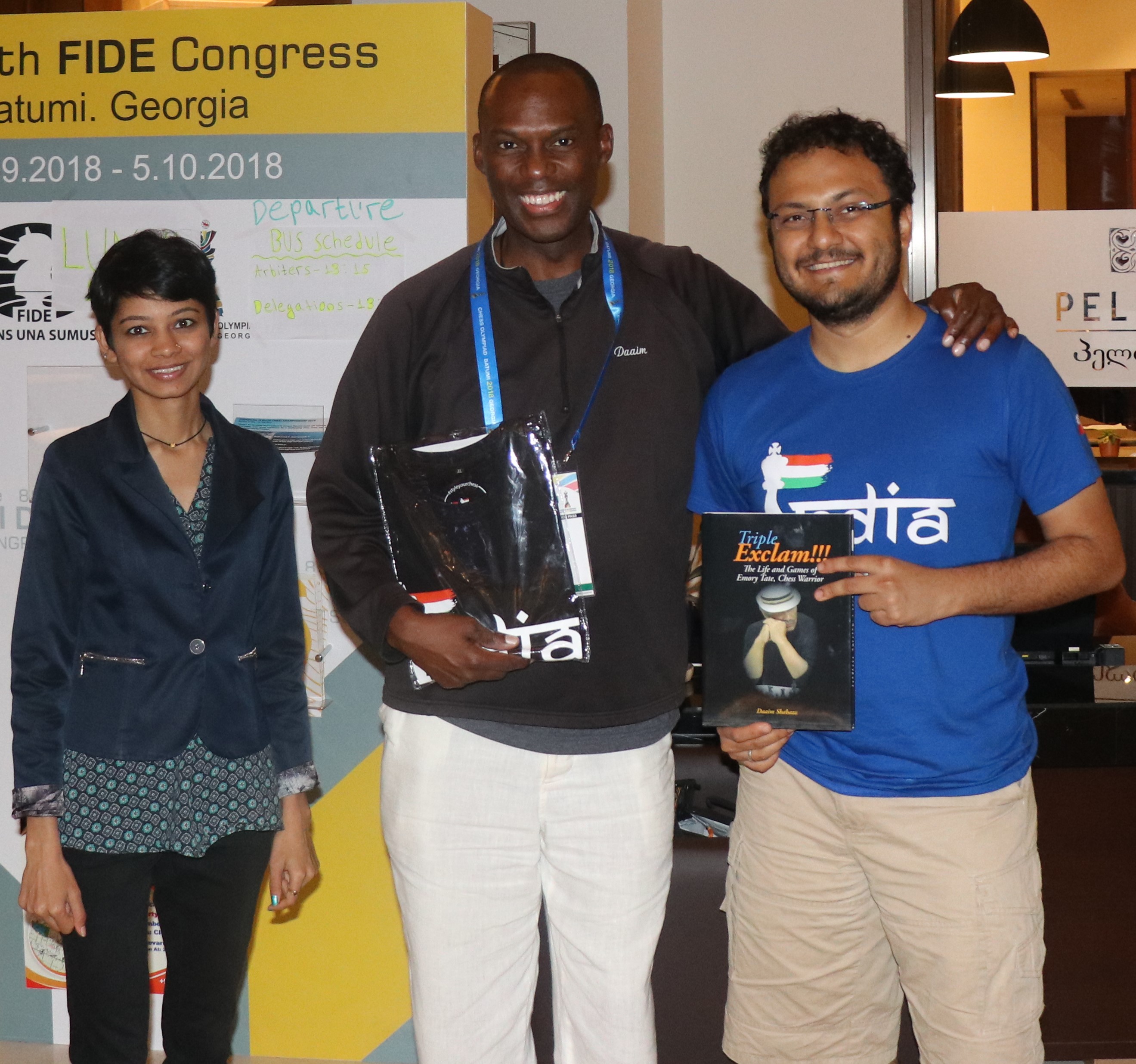
With Amruta Mokal and Sagar Shah of ChessBase India
at 2018 Chess Olympiad in Batumi, Georgia
Photo by Daaim Shabazz.
The questions posed at the press conference during Anand-Carlsen championship match in Chennai were targets of criticism for being repetitive and uniformed. Questions at last year’s Candidate’s tournament also missed the mark at times. This created puzzling looks and allowed Alexander Grischuk to display his brand of sarcastic humor. In hindsight, the laughs and following Grischuk’s “thug life” memes may have been good for chess.
The true strength of chess journalism will come in a way that we can express our thoughts whether they are critical or favorable. If chess is to grow, chess journalists must have the leverage to perform this task. It is only in this vein that chess can get the accurate coverage it deserves and put an end to the frequent mischaracterizations that hinder its efforts at sponsorship.
